没有被动语态的及物动词
- 格式:doc
- 大小:16.00 KB
- 文档页数:2
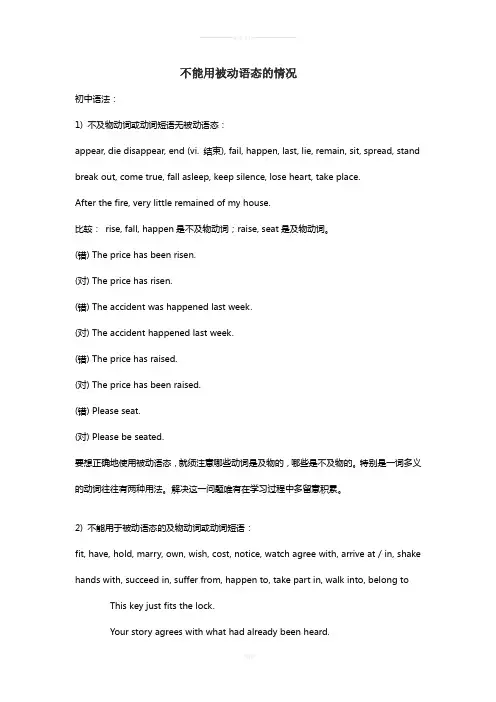
不能用被动语态的情况初中语法:1) 不及物动词或动词短语无被动语态:appear, die disappear, end (vi. 结束), fail, happen, last, lie, remain, sit, spread, stand break out, come true, fall asleep, keep silence, lose heart, take place.After the fire, very little remained of my house.比较:rise, fall, happen是不及物动词;raise, seat是及物动词。
(错) The price has been risen.(对) The price has risen.(错) The accident was happened last week.(对) The accident happened last week.(错) The price has raised.(对) The price has been raised.(错) Please seat.(对) Please be seated.要想正确地使用被动语态,就须注意哪些动词是及物的,哪些是不及物的。
特别是一词多义的动词往往有两种用法。
解决这一问题唯有在学习过程中多留意积累。
2) 不能用于被动语态的及物动词或动词短语:fit, have, hold, marry, own, wish, cost, notice, watch agree with, arrive at / in, shake hands with, succeed in, suffer from, happen to, take part in, walk into, belong to This key just fits the lock.Your story agrees with what had already been heard.3) 系动词无被动语态:appear, be become, fall, feel, get, grow, keep, look, remain, seem, smell, sound, stay, taste, turnIt sounds good.4) 带同源宾语的及物动词,反身代词,相互代词,不能用于被动语态:die, death, dream, live, lifeShe dreamed a bad dream last night.5) 当宾语是不定式时,很少用于被动语态。
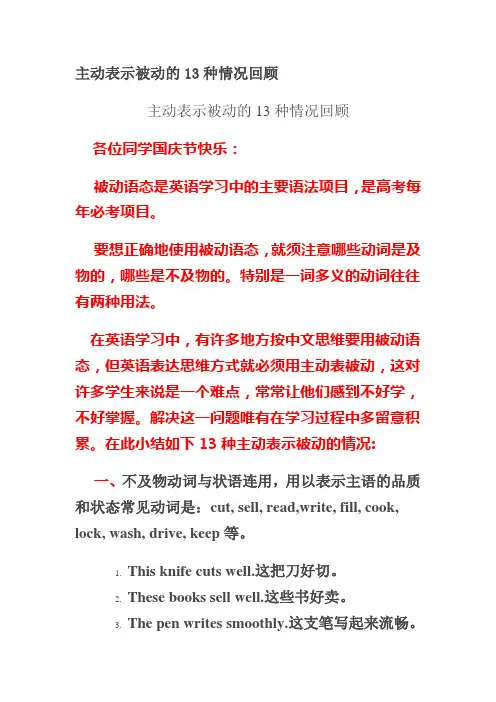
主动表示被动的13种情况回顾主动表示被动的13种情况回顾各位同学国庆节快乐:被动语态是英语学习中的主要语法项目,是高考每年必考项目。
要想正确地使用被动语态,就须注意哪些动词是及物的,哪些是不及物的。
特别是一词多义的动词往往有两种用法。
在英语学习中,有许多地方按中文思维要用被动语态,但英语表达思维方式就必须用主动表被动,这对许多学生来说是一个难点,常常让他们感到不好学,不好掌握。
解决这一问题唯有在学习过程中多留意积累。
在此小结如下13种主动表示被动的情况:一、不及物动词与状语连用,用以表示主语的品质和状态常见动词是:cut, sell, read,write, fill, cook, lock, wash, drive, keep等。
1.This knife cuts well.这把刀好切。
2.These books sell well.这些书好卖。
3.The pen writes smoothly.这支笔写起来流畅。
4.Meat won’t keep long in such hot weather.肉在这样热的天气里放不长久。
5.The cloth washes well.这种布好洗。
二、一些连系动词的主动式+形容词。
常见动look,smell,taste,sound,feel,prove,turn out等。
1.The apples taste good.2.The flower smells wonderful.3.The news proved/turned out true.4.Cotton feels soft.三、不定式在某些形容词之后,且与主语有动宾关系。
不定式修饰作表语和宾语补足语的形容词时,结构:主语+系动词+形容词+ 不定式;动词+宾语+形容词+不定式。
如果形容词是表示难易、利弊等含义: 用于此结构的常见形容词有:hard,defficult,easy,heavy,fit,good,comfortable,conve nient,impossible,convenient, cheap, expensive,(便利的,方便的), 等。
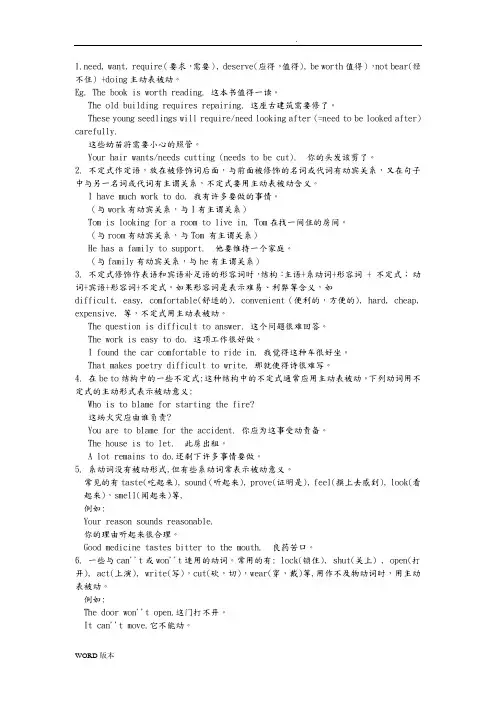
1.need, want, require(要求,需要), deserve(应得,值得), be worth值得),not bear(经不住) +doing主动表被动。
Eg. The book is worth reading. 这本书值得一读。
The old building requires repairing. 这座古建筑需要修了。
These young seedlings will require/need looking after (=need to be looked after) carefully.这些幼苗将需要小心的照管。
Your hair wants/needs cutting (needs to be cut).你的头发该剪了。
2. 不定式作定语,放在被修饰词后面,与前面被修饰的名词或代词有动宾关系,又在句子中与另一名词或代词有主谓关系,不定式要用主动表被动含义。
I have much work to do. 我有许多要做的事情。
(与work有动宾关系,与I有主谓关系)Tom is looking for a room to live in. Tom在找一间住的房间。
(与room有动宾关系,与Tom 有主谓关系)He has a family to support.他要维持一个家庭。
(与family有动宾关系,与he有主谓关系)3. 不定式修饰作表语和宾语补足语的形容词时,结构:主语+系动词+形容词 + 不定式;动词+宾语+形容词+不定式。
如果形容词是表示难易、利弊等含义,如difficult, easy, comfortable(舒适的), convenient(便利的,方便的), hard, cheap, expensive, 等,不定式用主动表被动。
The question is difficult to answer. 这个问题很难回答。
The work is easy to do. 这项工作很好做。
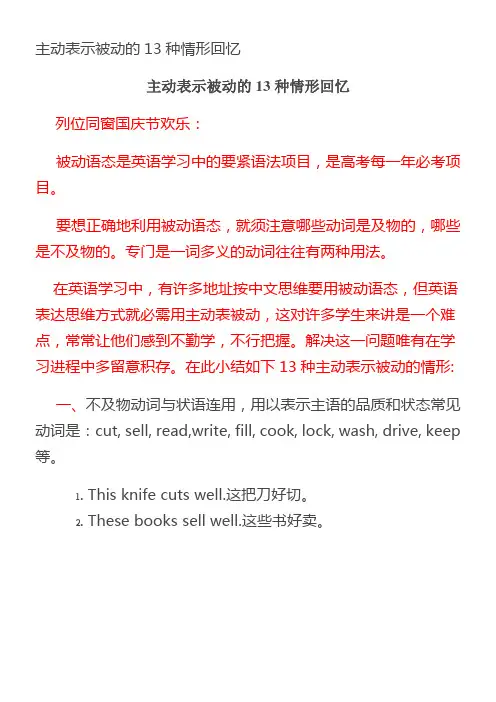
主动表示被动的13种情形回忆主动表示被动的13种情形回忆列位同窗国庆节欢乐:被动语态是英语学习中的要紧语法项目,是高考每一年必考项目。
要想正确地利用被动语态,就须注意哪些动词是及物的,哪些是不及物的。
专门是一词多义的动词往往有两种用法。
在英语学习中,有许多地址按中文思维要用被动语态,但英语表达思维方式就必需用主动表被动,这对许多学生来讲是一个难点,常常让他们感到不勤学,不行把握。
解决这一问题唯有在学习进程中多留意积存。
在此小结如下13种主动表示被动的情形:一、不及物动词与状语连用,用以表示主语的品质和状态常见动词是:cut, sell, read,write, fill, cook, lock, wash, drive, keep 等。
1.This knife cuts well.这把刀好切。
2.These books sell well.这些书好卖。
1.The pen writes smoothly.这支笔写起来流畅。
2.Meat won’t keep long in such hotweather.肉在如此热的天气里放不长久。
3.The cloth washes well.这种布好洗。
二、一些连系动词的主动式+形容词。
常见动look,smell,taste,sound,feel,prove,turn out等。
1.The apples taste good.2.The flower smells wonderful.3.The news proved/turned out true.4.Cotton feels soft.三、不定式在某些形容词以后,且与主语有动宾关系。
不定式修饰作表语和宾语补足语的形容词时,结构:主语+系动词+形容词+ 不定式;动词+宾语+形容词+不定式。
若是形容词是表示难易、利弊等含义:用于此结构的常见形容词有:hard,defficult,easy,heavy,fit,good,comfortable, convenient,impossible,convenient, cheap, expensive,(便利的,方便的), 等。
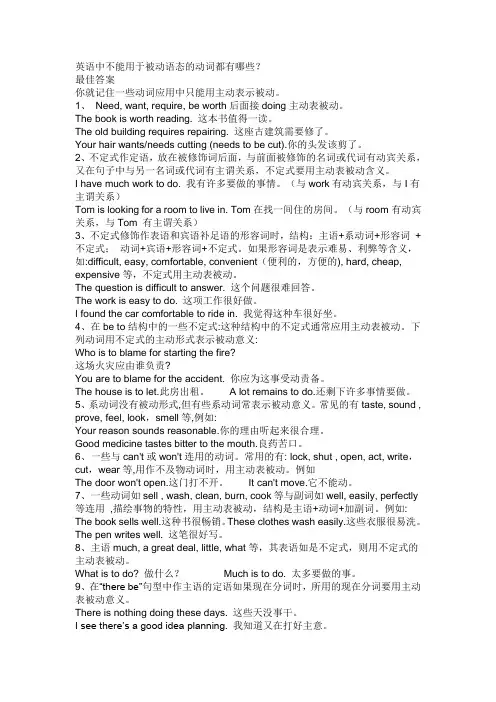
英语中不能用于被动语态的动词都有哪些?最佳答案你就记住一些动词应用中只能用主动表示被动。
1、Need, want, require, be worth后面接doing主动表被动。
The book is worth reading. 这本书值得一读。
The old building requires repairing. 这座古建筑需要修了。
Your hair wants/needs cutting (needs to be cut).你的头发该剪了。
2、不定式作定语,放在被修饰词后面,与前面被修饰的名词或代词有动宾关系,又在句子中与另一名词或代词有主谓关系,不定式要用主动表被动含义。
I have much work to do. 我有许多要做的事情。
(与work有动宾关系,与I有主谓关系)Tom is looking for a room to live in. Tom在找一间住的房间。
(与room有动宾关系,与Tom 有主谓关系)3、不定式修饰作表语和宾语补足语的形容词时,结构:主语+系动词+形容词+ 不定式;动词+宾语+形容词+不定式。
如果形容词是表示难易、利弊等含义,如:difficult, easy, comfortable, convenient(便利的,方便的), hard, cheap, expensive等,不定式用主动表被动。
The question is difficult to answer. 这个问题很难回答。
The work is easy to do. 这项工作很好做。
I found the car comfortable to ride in. 我觉得这种车很好坐。
4、在be to结构中的一些不定式:这种结构中的不定式通常应用主动表被动。
下列动词用不定式的主动形式表示被动意义:Who is to blame for starting the fire?这场火灾应由谁负责?You are to blame for the accident. 你应为这事受动责备。
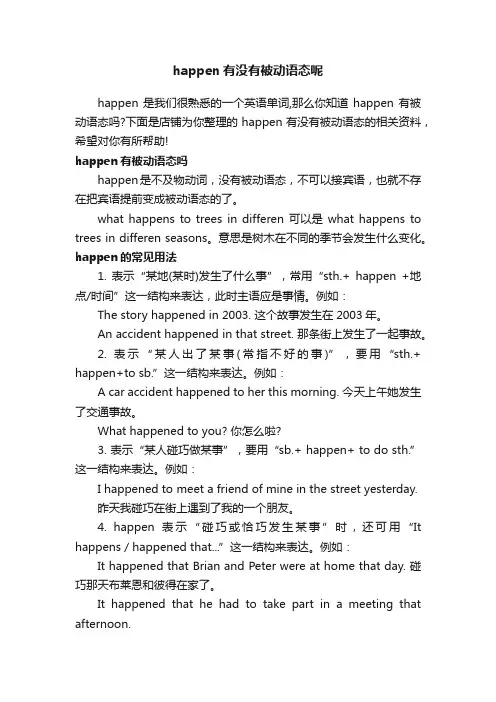
happen有没有被动语态呢happen是我们很熟悉的一个英语单词,那么你知道happen有被动语态吗?下面是店铺为你整理的happen有没有被动语态的相关资料,希望对你有所帮助!happen有被动语态吗happen是不及物动词,没有被动语态,不可以接宾语,也就不存在把宾语提前变成被动语态的了。
what happens to trees in differen可以是what happens to trees in differen seasons。
意思是树木在不同的季节会发生什么变化。
happen的常见用法1. 表示“某地(某时)发生了什么事”,常用“sth.+ happen +地点/时间”这一结构来表达,此时主语应是事情。
例如:The story happened in 2003. 这个故事发生在2003年。
An accident happened in that street. 那条街上发生了一起事故。
2. 表示“某人出了某事(常指不好的事)”,要用“sth.+ happen+to sb.”这一结构来表达。
例如:A car accident happened to her this morning. 今天上午她发生了交通事故。
What happened to you? 你怎么啦?3. 表示“某人碰巧做某事”,要用“sb.+ happen+ to do sth.”这一结构来表达。
例如:I happened to meet a friend of mine in the street yesterday.昨天我碰巧在街上遇到了我的一个朋友。
4. happen表示“碰巧或恰巧发生某事”时,还可用“It happens / happened that...”这一结构来表达。
例如:It happened that Brian and Peter were at home that day. 碰巧那天布莱恩和彼得在家了。
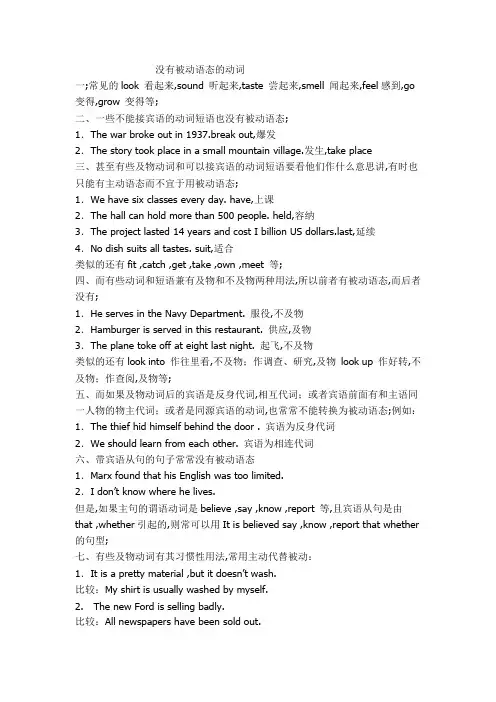
没有被动语态的动词一;常见的look 看起来,sound 听起来,taste 尝起来,smell 闻起来,feel感到,go 变得,grow 变得等;二、一些不能接宾语的动词短语也没有被动语态;1.The war broke out in 1937.break out,爆发2.The story took place in a small mountain village.发生,take place三、甚至有些及物动词和可以接宾语的动词短语要看他们作什么意思讲,有时也只能有主动语态而不宜于用被动语态;1.We have six classes every day. have,上课2.The hall can hold more than 500 people. held,容纳3.The project lasted 14 years and cost I billion US st,延续4.No dish suits all tastes. suit,适合类似的还有fit ,catch ,get ,take ,own ,meet 等;四、而有些动词和短语兼有及物和不及物两种用法,所以前者有被动语态,而后者没有;1.He serves in the Navy Department. 服役,不及物2.Hamburger is served in this restaurant. 供应,及物3.The plane toke off at eight last night. 起飞,不及物类似的还有look into 作往里看,不及物;作调查、研究,及物look up 作好转,不及物;作查阅,及物等;五、而如果及物动词后的宾语是反身代词,相互代词;或者宾语前面有和主语同一人物的物主代词;或者是同源宾语的动词,也常常不能转换为被动语态;例如:1.The thief hid himself behind the door . 宾语为反身代词2.We should learn from each other. 宾语为相连代词六、带宾语从句的句子常常没有被动语态1.Marx found that his English was too limited.2.I don’t know where he lives.但是,如果主句的谓语动词是believe ,say ,know ,report 等,且宾语从句是由that ,whether引起的,则常可以用It is believed say ,know ,report that whether 的句型;七、有些及物动词有其习惯性用法,常用主动代替被动:1.It is a pretty material ,but it doesn’t wash.比较:My shirt is usually washed by myself.2. The new Ford is selling badly.比较:All newspapers have been sold out.类似的还有clean ,lock ,write ,play ,start ,cut等;八、最后要说的是另一种情况:英语中有不少动词及动词短语常用被动形式来表示主动的含义;1.Be seated, please2.We must be prepared for the worst.类似的还有be determined to ,be absorbed in , be gone , be married to , behi dden , be interested in ……and advanced mathematics ,experienced school , learned man 等中这些定语用的过去分词也是用过去分词表主动;I dreamed a good dream.我做了一个好梦一般不会说A good dream was dreamed.AS的基本用法as ... as用于比较句型,中间插入的是形容词或副词的原级;意思是"达到与什么相同的程度";如:He is as strong as a horse. 他力大如牛;二、习惯用法1. as soon as意思是"一......就......",引导一个时间状语从句;如:I'll call you as soon as I finish my homework. 我一完成我的作业,就给你打电话;2. as long as意思是"长达......之久;只要......";如:She has searched the information about dinosaurs on the Internet as long as three hours. 她在因特网上搜索有关恐龙的信息已经长达三个小时;3. as much as意思是"高达......;与......一样多";是用来表达极其多的语气;如:Some of the stones weigh as much as fifteen tons.有些石头重达15吨;★as...as用法:as...as意为"和……一样",表示同级的比较;使用时要注意第一个as为副词,第二个as为连词;其基本结构为:as+ adj./ adv. +as;例如:1This film is as interesting as that one.这部电影和那部电影一样有趣;其否定式为not as/so +adj./ adv. +as;例如:This dictionary is not as/so useful as you think.这本字典不如你想象的那样有用; 若有修饰成分,如twice, three times, half, a quarter等,则须置于第一个as之前;例如:Your bag is twice as expensive as mine.你的袋子比我的贵一倍;几个关于as...as的常见句型:1as...as possiblePlease answer my question as soon as possible.请尽快回答我的问题;2as...as usual/beforeShe looks as pretty as before.她看起来和以前一样漂亮;3as long as... 引导条件状语从句It took us as long as three years to carry out the plan.我们花了长达三年的时间才完成这项计划;4as far asHe walked as far as the railway station yesterday evening.昨天傍晚,他一直散步到火车站;5as well asShe cooks as well as her mother does.她烧菜烧得跟她母亲一样好;★as...as的结构:as + 形容词或副词原级 + as1在否定句或疑问句中可用so… as;He cannot run so/as fast as you.2当as… as 中间有名词时采用以下格式;as +形容词+ a +单数名词as + many/much +名词This is as good an example as the other is.I can carry as much paper as you can..3用表示倍数的词或其他程度副词做修饰语时,放在as的前面;This room is twice as big as that one.Your room is the same size as mine.4 倍数+ as + adj. + as <=> 倍数+ then + ofThis bridge is three times as long as that one.This bridge is three times the length of that one.Your room is twice as large as mine.Your room is twice the size of mine.。
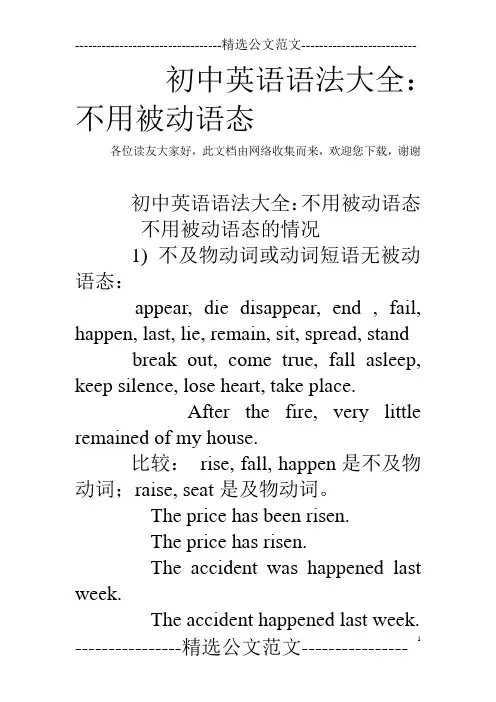
初中英语语法大全:不用被动语态各位读友大家好,此文档由网络收集而来,欢迎您下载,谢谢初中英语语法大全:不用被动语态不用被动语态的情况1) 不及物动词或动词短语无被动语态:appear, die disappear, end , fail, happen, last, lie, remain, sit, spread, stand break out, come true, fall asleep, keep silence, lose heart, take place.After the fire, very little remained of my house.比较:rise, fall, happen是不及物动词;raise, seat是及物动词。
The price has been risen.The price has risen.The accident was happened last week.The accident happened last week.The price has raised.The price has been raised.Please seat.Please be seated.要想正确地使用被动语态,就须注意哪些动词是及物的,哪些是不及物的。
特别是一词多义的动词往往有两种用法。
解决这一问题唯有在学习过程中多留意积累。
2) 不能用于被动语态的及物动词或动词短语:fit, have, hold, marry, own, wish, cost, notice, watch agree with, arrive at / in, shake hands with, succeed in, suffer from, happen to, take part in, walk into, belong toThis key just fits the lock.Your story agrees with what had already been heard.3) 系动词无被动语态:appear, be become, fall, feel, get,grow, keep, look, remain, seem, smell, sound, stay, taste, turnIt sounds good.4) 带同源宾语的及物动词,反身代词,相互代词,不能用于被动语态:die, death, dream, live, lifeShe dreamed a bad dream last night.5) 当宾语是不定式时,很少用于被动语态。
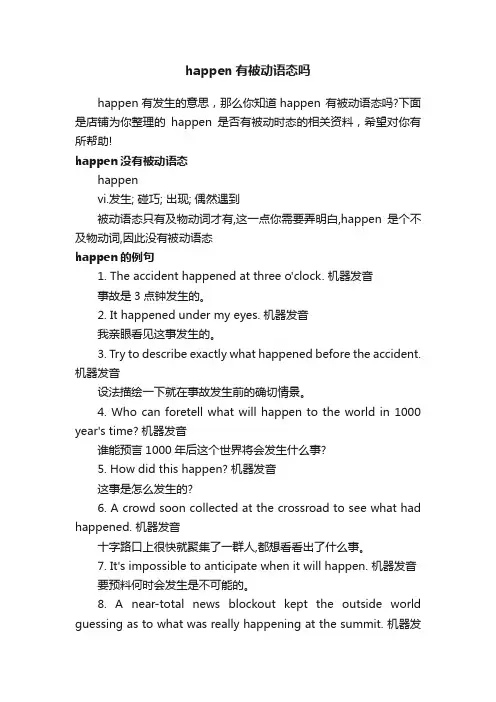
happen有被动语态吗happen有发生的意思,那么你知道happen 有被动语态吗?下面是店铺为你整理的happen是否有被动时态的相关资料,希望对你有所帮助!happen没有被动语态happenvi.发生; 碰巧; 出现; 偶然遇到被动语态只有及物动词才有,这一点你需要弄明白,happen是个不及物动词,因此没有被动语态happen的例句1. The accident happened at three o'clock. 机器发音事故是3点钟发生的。
2. It happened under my eyes. 机器发音我亲眼看见这事发生的。
3. Try to describe exactly what happened before the accident. 机器发音设法描绘一下就在事故发生前的确切情景。
4. Who can foretell what will happen to the world in 1000 year's time? 机器发音谁能预言1000年后这个世界将会发生什么事?5. How did this happen? 机器发音这事是怎么发生的?6. A crowd soon collected at the crossroad to see what had happened. 机器发音十字路口上很快就聚集了一群人,都想看看出了什么事。
7. It's impossible to anticipate when it will happen. 机器发音要预料何时会发生是不可能的。
8. A near-total news blockout kept the outside world guessing as to what was really happening at the summit. 机器发音由于对会议实行了全面新闻封锁,外界人士对首脑会议只能进行猜测。
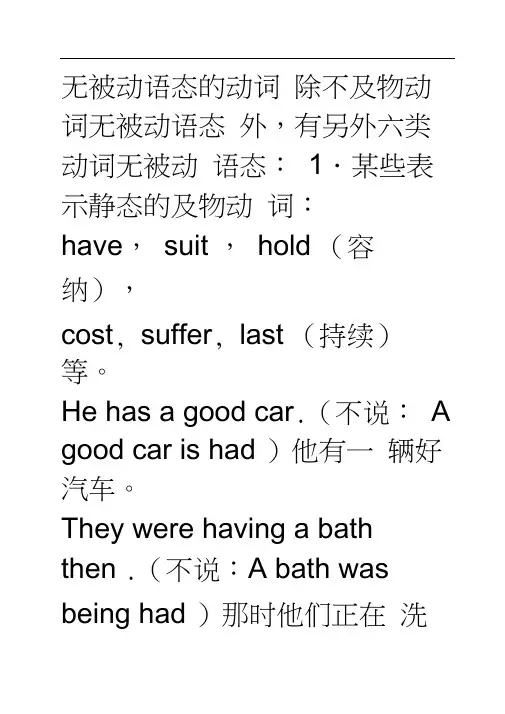
无被动语态的动词除不及物动词无被动语态外,有另外六类动词无被动语态:1.某些表示静态的及物动词:have,suit ,hold (容纳),cost, suffer, last (持续)等。
He has a good car.(不说:A good car is had )他有一辆好汽车。
They were having a baththen .(不说:A bath was being had )那时他们正在洗澡。
The shoes don't fit me.(不说:I'm not fitted by )这双鞋不合适我。
He resembles his father.(不说:His father is resembled by…)他长得像他父亲。
The shirt suits me well.(不说:I'm suited by )•这衬衫很合我身。
The room can hold 500 people.(不说:500 people can be held by )这•房间能容纳500 个人。
The book cost me five dollars.(不说:I was cost five dollars by )这本书花了我5 美元。
They suffered heavy losses.(不说:They weresuffered )…他们损失惨重。
2.某些由及物动词转变的自动词(不需借助宾语即可表达动作,区别他动词,需要借助宾语表达动作)这类动词常见的有:promise (有指望),sell, wash,write ,wear,read,break out,run out ,give out,add up to,take place,turn out (证实),catch (挂住),The goods sell well.(不说:…are sold )••• 这些商品畅销。
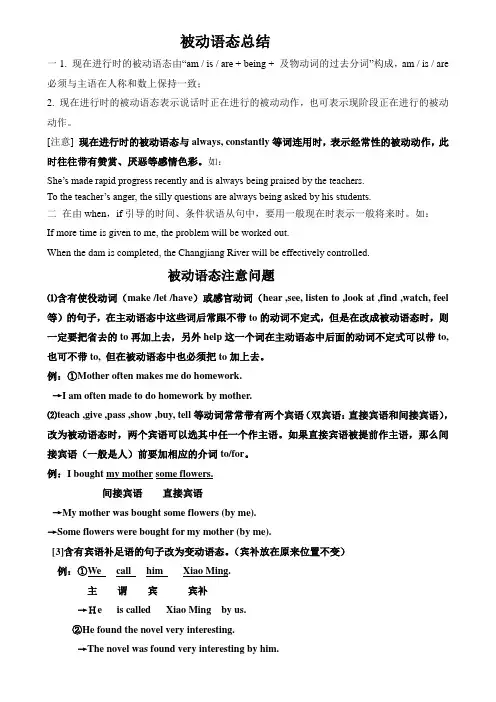
被动语态总结一1. 现在进行时的被动语态由“am / is / are + being + 及物动词的过去分词”构成,am / is / are 必须与主语在人称和数上保持一致;2. 现在进行时的被动语态表示说话时正在进行的被动动作,也可表示现阶段正在进行的被动动作。
[注意] 现在进行时的被动语态与always, constantly等词连用时,表示经常性的被动动作,此时往往带有赞赏、厌恶等感情色彩。
如:She’s made rapid progress recently and is always being praised by the teachers.To the teacher’s anger, the silly questions are always being asked by his students.二在由when,if引导的时间、条件状语从句中,要用一般现在时表示一般将来时。
如:If more time is given to me, the problem will be worked out.When the dam is completed, the Changjiang River will be effectively controlled.被动语态注意问题⑴含有使役动词(make /let /have)或感官动词(hear ,see, listen to ,look at ,find ,watch, feel 等)的句子,在主动语态中这些词后常跟不带to的动词不定式,但是在改成被动语态时,则一定要把省去的to再加上去,另外help这一个词在主动语态中后面的动词不定式可以带to,也可不带to, 但在被动语态中也必须把to加上去。
例:①Mother often makes me do homework.→I am often made to do homework by mother.⑵teach ,give ,pass ,show ,buy, tell等动词常常带有两个宾语(双宾语:直接宾语和间接宾语),改为被动语态时,两个宾语可以选其中任一个作主语。
英语中不能用于被动语态的动词都有哪些?希望高手总结一下,最好每个带一个例句。
最佳答案你就记住一些动词应用中只能用主动表示被动。
1、Need, want, require(要求,需要), deserve(应得,值得), be worth值得),not bear(经不住) 后面接doing主动表被动。
The book is worth reading. 这本书值得一读。
The old building requires repairing. 这座古建筑需要修了。
These young seedlings will require/need looking after (=need to be looked after) carefully. 这些幼苗将需要小心的照管。
Your hair wants/needs cutting (needs to be cut). 你的头发该剪了。
2、不定式作定语,放在被修饰词后面,与前面被修饰的名词或代词有动宾关系,又在句子中与另一名词或代词有主谓关系,不定式要用主动表被动含义。
I have much work to do. 我有许多要做的事情。
(与work有动宾关系,与I有主谓关系)Tom is looking for a room to live in. Tom在找一间住的房间。
(与room有动宾关系,与Tom 有主谓关系)He has a family to support. 他要维持一个家庭。
(与family有动宾关系,与he有主谓关系)3、不定式修饰作表语和宾语补足语的形容词时,结构:主语+系动词+形容词+ 不定式;动词+宾语+形容词+不定式。
如果形容词是表示难易、利弊等含义,如difficult, easy, comfortable(舒适的), convenient(便利的,方便的), hard, cheap, expensive, 等,不定式用主动表被动。
主动表示被动的13种情况回顾主动表示被动的13种情况回顾各位同学国庆节快乐:被动语态是英语学习中的主要语法项目,是高考每年必考项目。
要想正确地使用被动语态,就须注意哪些动词是及物的,哪些是不及物的。
特别是一词多义的动词往往有两种用法。
在英语学习中,有许多地方按中文思维要用被动语态,但英语表达思维方式就必须用主动表被动,这对许多学生来说是一个难点,常常让他们感到不好学,不好掌握。
解决这一问题唯有在学习过程中多留意积累。
在此小结如下13种主动表示被动的情况:一、不及物动词与状语连用,用以表示主语的品质和状态常见动词是:cut, sell, read,write, fill, cook, lock, wash, drive, keep等。
1.This knife cuts well.这把刀好切。
2.These books sell well.这些书好卖。
3.The pen writes smoothly.这支笔写起来流畅。
4.Meat won’t keep long in such hot weather.肉在这样热的天气里放不长久。
5.The cloth washes well.这种布好洗。
二、一些连系动词的主动式+形容词。
常见动look,smell,taste,sound,feel,prove,turn out等。
1.The apples taste good.2.The flower smells wonderful.3.The news proved/turned out true.4.Cotton feels soft.三、不定式在某些形容词之后,且与主语有动宾关系。
不定式修饰作表语和宾语补足语的形容词时,结构:主语+系动词+形容词+ 不定式;动词+宾语+形容词+不定式。
如果形容词是表示难易、利弊等含义: 用于此结构的常见形容词有:hard,defficult,easy,heavy,fit,good,comfortable,conve nient,impossible,convenient, cheap, expensive,(便利的,方便的), 等。
英语不能用被动语态的若干情况■不及物动词没有被动语态,如rise, happen, succeed, remain, lie, disappear, last等。
如:After the fire, nothing remained.那场大火之后,什么也没留下来了。
误:After the fire, nothing was remained.■不及物动词短语没有被动语态,如:take place, break out, belong to等。
如:Great changes have taken place here since 1990.自1990年以来这里发生了巨大的变化.误:Great changes have been taken place here since 1990.■有的及物动词也没有被动语态,如cost, leave, enter, reach, suit, have, wish,hold, own, lack, fit, resemble, jump, mind等。
如:She entered the room just now.他刚才进过房间。
误:The room was entered by her just now.Tom jumped the queue.汤姆插队。
误:The queue was jumped by Tom.■有些及物的短语动词也没有被动语态,如agree with, arrive at/in, shake handswith, succeed in, suffer from, happen to, walk into, belong to等。
如:I don’t agree with him.我不同意他的看法。
误:He isn’t agreed with by me. ()■宾语是反身代词、相互代词、同源宾语、不定式、v-ing形式及抽象名词等,都不能变为被动句子的主语,如:I taught myself French.我自学法语。
及物动词并非都能用于被动语态四川省彭州中学樊文生(该文系本人原创,曾发表于全国核心期刊《中小学外语教学》)由于被动语态不完全从属于主动语态,因此并不是所有带宾语的及物动词的主动结构都可以改为被动结构。
在不少情况下,带宾语的主动句不能改为被动句。
常见的情况有以下十六种:一. 一些表示状态的及物动词谓语是表示状态的一些及物动词,如 fail, last, suit, contain, own, hold, fit, cost, lack, want(缺少), become, flee, have(有、吃、患病)等。
例如:The hall holds 1,000 people. 大厅可容纳1,000人。
不能说:1,000 people are held in the hall.He has a new dictionary. 他有一本新字典。
I have bad colds every year. 我每年都要患重感冒。
The jacket does not fit you. 这件衣服不合你身。
We have lunch at 12:30. 我们十二点半吃午饭。
Does the pair of shoes suit you? 你穿这双鞋合适吗?Who owns this land? 这块地属谁所有?He never fails to write to his mother every week.•他每周给他妈妈写信。
The pay could last the girl only a few days. •这工资只能维持那女子几天的生活。
She lacks experience. 他缺少经验。
*但 have 一词不作“有、吃、患病”讲时,却可以有被动语态。
例如:I'm afraid you've been had.(= have been cheated) 恐怕你受骗了。
There was no butter to be had.(to be bought) 黄油买不到。
1. 及物动词后面必须跟宾语意义才完整的实义动词,叫做及物动词(transi tiveverb)。
有的动词必须接一个宾语,有的必须接两个宾语。
如:He's readin g a magazi ne. 他正在读一本杂志。
(单宾语)Mr Zhangteache s us Englis h. 张老师教我们英语。
(双宾语:us是间接宾语,Englis h 是直接宾语)2. 不及物动词本身意义完整后面不须跟宾语的实义动词,叫做不及物动词(intran sitiv e verb)。
如:It happen ed in June 1932. 这件事发生于一九三二年六月。
He is lookin g around. 他环顾四周。
如果想接宾语,动词后面必须加上介词:False: He is lookin g me.Right: He is lookin g at me.*注意:不及物动词没有被动语态。
3. 兼作及物动词和不及物动词英语里有不少实义动词可以兼作及物动词和不及物动词。
这样的动词又有两种不同的情况:a) 兼作及物动词和不及物动词时,意义不变。
试比较:ShallI beginat once? 我可以立刻开始吗?(begin作不及物动词)She beganworkin g as a librar ian aftershe left school. 她毕业后当图书馆管理员。
(begin作及物动词)When did they leaveChicag o? 他们是什么时候离开芝加哥的?(leave作及物动词)They left last week. 他们是上周离开的。
(leave作不及物动词)b) 兼作及物动词和不及物动词时,有时意义不尽相同。
试比较:Wash your handsbefore meals.饭前要洗手。
没有被动语态的及物动词
众所周知,英语的被动语态是由be+及物动词的过去分词构成。
有人认为似乎所有的及物动词都可转换成相应的被动语。
其实不然,至少在某种意义上,有些及物动词不能用于被动语态。
一、当句子的谓语是表示“拥有”、“容纳”、“缺少”概念的及物动词时。
例如:
1.The millionaire possesses great wealth.这位百万富翁拥有大量的财富。
不能说:Great wealth is possessed by the millionaire.
2.The newly-constructed reservoir holds a lot of water.新水库蓄水量很大。
不能说:A lot of water is held by the newly-constructed reser-voir.
3.The house comprises five rooms.这幢房子有五个房间。
不能说:Five rooms are comprised by the house.
4,John Smith always lacks confidence.约翰·史密斯总是缺乏自信心。
不能说:Confidence is always lacked by John Smith.
二、当句子的谓语是表示“适合”的及物动词,如suit,become,fit等时,没有相应的被动语态。
1.The blue skirt becomes Mary very well.这条蓝裙子玛丽穿上去很合适。
不能说:Mary is become very well by the blue skirt.
2.Will the date suit you这个日子对你合适吗
不能说:Will you be suited by the date
3.We should fit our deeds to our words.我们应该言行一致。
不能说:Our deeds should be fitted to our words by us.
三、当句子的谓语是表示“相互作用”的及物动词,如:equal,mean,resemble等时。
1.No one equals him in intelligence.他的智力是无与伦比的。
不能说:He is equaled by no one in intelligence.
2.Revolution means liberating productive force.革命就是解放生产力。
不能说:Liberating productive force is meant by revolution.
3.The two boys resemble each other in appearance.这两个男孩长得相似。
不能说:Each other is resembled by the two boys in appearance.
四、当句子的谓语是表示“明白”意义的及物动词,如:get,catch,take时,也没有相应的被动语态。
1.The boy said,“I didn’t catch the last two words.”这个男孩说:“我没听清楚最后两个词。
”
不能说:The boy said,“The last two words weren’t caught by me.”
2.I don’t take you at all.你说的我一点也不懂。
不能说:You aren’t take n by me at all.
五、动词have作“有、接受、度过、吃、经历”解时,没有被动语态。
1.I have five good dictionaries.我有五本好词典。
不能说:Five good dictionaries are had by me.
2.I had three letters from Mr.Green.我收到过格林先生三封信。
不能说:Three letters were had by me from Mr.Green.
3.We shall have a good Spring Festival.我们将过一个愉快的春节。
不能说:A good Spring Festival will be had by us.
4.I usually have breakfast at half past six.我通常六点半吃早饭。
不能说:Breakfast is usually had by me at half past six.
六、当及物动词last表示“持续”、“经久”的含义时,也没有相应的被动语态。
This coat has lasted me five years.这件外衣我已穿了五年。
不能说:I have been lasted five years by this coat.
七、及物动词cost表示“价值”、“花费”意义时,没有被动语态。
That project cost them too much in man-power,material and money.那项工程耗费了他们大量的人力、物力和财力。
不能说:They were cost too much in manpower,material and money by the project.
八、及物动词“befall”表示“临到……头上”,“发生于”之意时,没有被动语态。
A succession of misfortunes befell the poor little girl.这个可怜的女孩遭受了种种不幸。
不能说:The poor little girl was befallen by a succession of misfortunes.
综上所述,并非所有的及物动词都可用于被动语态。
所以我们要仔细辨析,以免用错。